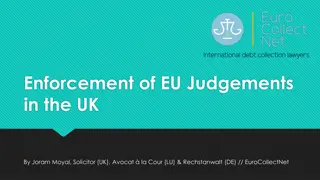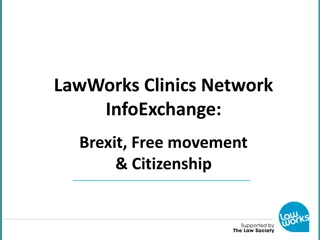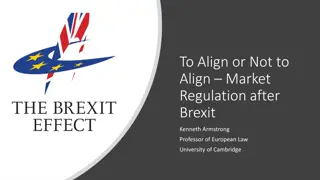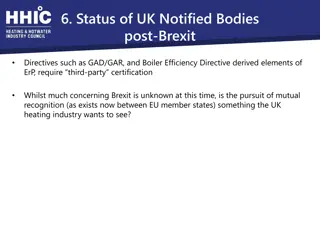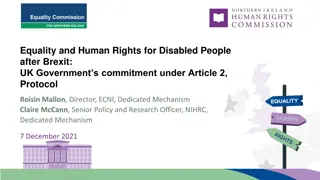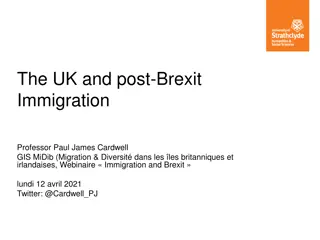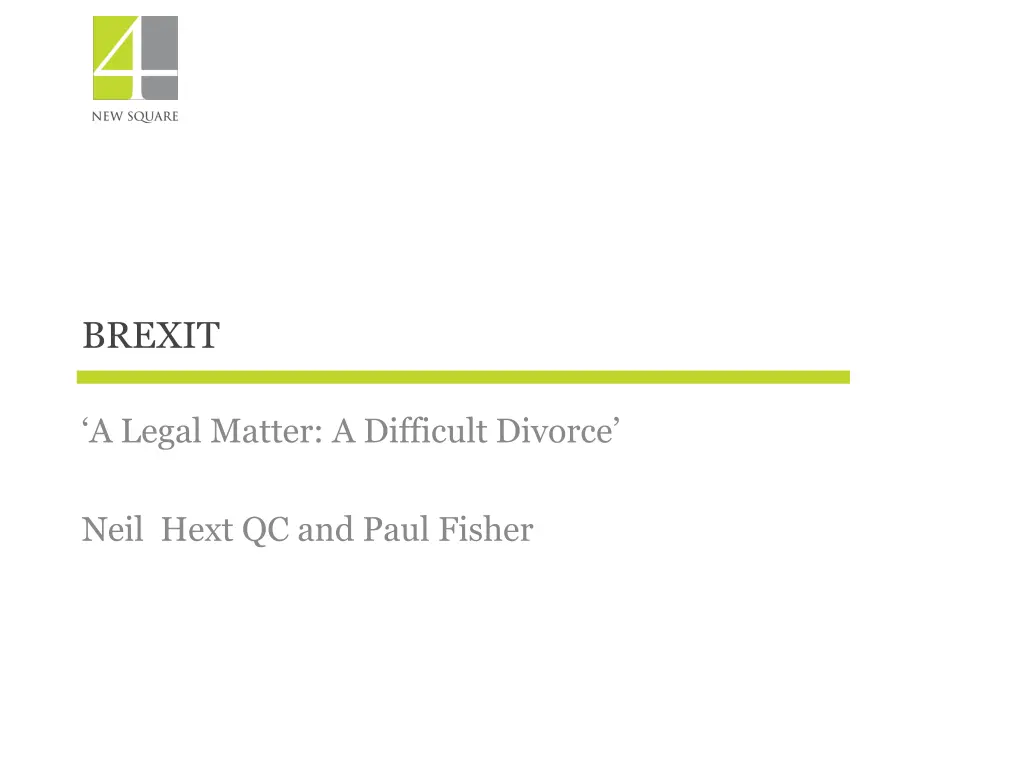
Brexit Legal Matters: Divorce, Sovereignty, and Royal Prerogative
Explore the legal complexities of Brexit, including the voluntary acceptance and rescinding of EU agreements, the implications of the 1972 European Communities Act, and the Royal Prerogative rulings. Delve into the intricacies of EU law and the implications for the UK post-Brexit.
Uploaded on | 1 Views
Download Presentation

Please find below an Image/Link to download the presentation.
The content on the website is provided AS IS for your information and personal use only. It may not be sold, licensed, or shared on other websites without obtaining consent from the author. If you encounter any issues during the download, it is possible that the publisher has removed the file from their server.
You are allowed to download the files provided on this website for personal or commercial use, subject to the condition that they are used lawfully. All files are the property of their respective owners.
The content on the website is provided AS IS for your information and personal use only. It may not be sold, licensed, or shared on other websites without obtaining consent from the author.
E N D
Presentation Transcript
BREXIT A Legal Matter: A Difficult Divorce Neil Hext QC and Paul Fisher
Voluntarily Accepted Regina v Secretary of State for Transport, Ex parte Factortame Ltd. and Others (No. 2) [1990] 3 W.L.R. 818 whatever limitation of its sovereignty Parliament accepted when it enacted the European Communities Act 1972 was entirely voluntary. 1972 UK was NOT a member of the EU An Act to make provision in connection with the enlargement of the European Communities to include the United Kingdom, together with (for certain purposes) the Channel Islands, the Isle of Man and Gibraltar.
Voluntarily Rescinded EU Constitution 2005 French and Dutch Referendums (UK was due to have its own) Lisbon Treaty 2007 entered into force on 1 December 2009 Article 50 of the TEU the Amato Admission Two important questions left unasked and unanswered 23 June 2016
Royal Prerogative: Miller R. (on the application of Miller) v Secretary of State for Exiting the European Union [2016] EWHC 2768 Limits of the prerogative: By making and unmaking treaties the Crown . cannot without the intervention of Parliament confer rights on individuals or deprive individuals of rights (at [32]) intended to legislate by that Act so as to introduce EU law into domestic law in such a way that this could not be undone by exercise of Crown prerogative power. (at [92]) R (on the application of Miller) v Secretary of State for Exiting the European Union [2018] A.C. 61 Section 2(1) ECA 1972: all directly applicable EU law is UK law and enforceable as such It is common ground that if the UK withdraws from the Treaties pursuant to a notice given under article 50EU , there will no longer be any enforceable EU rights in relation to which this provision will have any application. Section 2(1) would be stripped of any practical effect. (para 51) Section 2(2) of ECA 1972: Ministers of the Crown empowered to give effect to non-directly applicable EU law. This provides for subordinate legislation to be promulgated to address those parts of EU law that are not directly applicable in domestic law, in particular to satisfy the requirements of Directives that are intended to be implemented by national measures. If the UK withdraws from the Treaties pursuant to a notice given under article 50EU , this provision would in due course inevitably be deprived of any practical application.'
FINNIS POSITION The 1972 Act does not create rights or obligations. Section 2(1) All such rights, powers, liabilities, obligations and restrictions from time to time created or arising by or under the Treaties, and all such remedies and procedures from time to time provided for by or under the Treaties, as in accordance with the Treaties are without further enactment to be given legal effect or used in the United Kingdom shall be recognised and available in law, and be enforced, allowed and followed accordingly; and the expression enforceable EU right and similar expressions shall be read as referring to one to which this subsection applies.
Lord Reed Withdrawal under article 50EU alters the application of the 1972 Act, but is not inconsistent with it. The application of the 1972 Act after a withdrawal agreement has entered into force (or the applicable time limit has expired) is the same as it was before the Treaty of Accession entered into force. (Lord Reed at [204]) Treaty of Lisbon in the European Union (Amendment )Act 2008 included Treaty of Lisbon (and Article 50) to the list of treaties included within Section 1(2) of the European Communities Act 1972. If Parliament chooses to give domestic effect to a Treaty containing a power of termination, it does not follow that Parliament must have stripped the Crown of its authority to exercise that power. (Lord Reed at [204])
Withdrawal Agreement: The End in Sight? ECA Repealed: Section 1 Exit Day Defined: Section 20(1) (subject to Section 20(4)) End to supremacy of EU Law (section 5)? Future CJEU decisions not binding on English Courts. No references section 6(1)(b) Directives end of direct effect on Exit Day (section 4(2)(b)) Validity Challenges End to Francovich Damages
Freeze Frame EU Law still supreme after exit day in relation to any rule of law passed before exit day (section 5(2)) and modifications thereto (section 5(3)). Section 5(3) is rather vague. CJEU Jurisprudence: Past CJEU/ECJ decisions are binding (albeit not for SC and HCJ) SC and HCJ tests apply. May have regard to CJEU jurisprudence after Exit Day so far as relevant (section 6(2)). Some aspects of the Act are in need of very careful interpretation: Section 4(1) of the Act preserves many fundamental EU Treaty rights. Section 8 pressure valve
Cross-Border Litigation within Europe EU legislation directly applicable Jurisdiction and recognition/enforcement of judgments: Recast Brussels Regulation (EU) and Lugano Convention (Iceland, Norway, Switzerland) Choice of law: Rome I (contractual obligations) and Rome II (non-contractual obligations) Insolvency Regulation Service Regulation and Evidence Regulation
Post-Brexit Withdrawal Agreement Draft Agreement on the Withdrawal of the UK from the EU, 19 March 2018 (and see also update 19 June 2018), arts 62, 63, 64, 121; Transition period from 30 March 2019 to 31 December 2020 All EU cross-border legal proceedings commenced before the end of the transition period will be governed by Recast Brussels Regulation Recast Brussels Regulation also to govern judgments in such proceedings
Post-Brexit Withdrawal Agreement Insolvency Regulation to continue to apply where main proceedings opened during transition period Rome I and II applicable to contracts concluded before end of transition and to events giving rise to damage occurring before end of transition (respectively) Service Regulation and Evidence Regulation continue in force in transition period
Beyond Transition? After the Transition Period a matter of negotiation UK Government says that intends (Framework: Civil Judicial Cooperation, June 2018; White Paper, July 2018): To (re)join the Lugano Convention To explore a new bilateral agreement with the EU on civil judicial cooperation, covering a coherent package of rules on jurisdiction, choice of jurisdiction, applicable law and recognition and enforcement of judgments
No Deal Brexit Handling civil legal cases that involve EU countries if there s no Brexit deal, 13 September 2018 Much of EU jurisdiction and enforcement legislation operates on a reciprocal basis Government proposal: to repeal reciprocal measures that would otherwise remain part of our law to leave in force those measures that do not depend upon reciprocity to (re)join the 2005 Hague Convention on Choice of Court Agreements
No Deal Brexit The following would be repealed in the UK: The Recast Brussels Regulation (EU) The Lugano Convention (Norway, Iceland, Switzerland) The majority of the Insolvency Regulation The Service Regulation and the Taking of Evidence Regulation Rome I and Rome II Regulations on applicable law would remain in force
No Deal Brexit Hague Convention on Choice of Court Agreements 2005 UK s current membership through the EU will automatically cease on exit day UK will apply to become an independent contracting party to the Convention so that it again comes into force here But this can only occur at the earliest by 1 April 2019 and the Convention applies on its face to agreements entered into after it comes into force in the relevant jurisdiction UK says it will apply the Convention to pre-exit agreements and agreements entered into in the gap as if the Convention had applied seamlessly (see draft SI The Civil Jurisdiction and Judgments (Hague Convention )(EU Exit) Regulations 2018 ) However, position in other contracting states is uncertain
No Deal Brexit Implications Rome I/Rome II will probably remain in force New exclusive jurisdiction clauses will have benefit of 2005 Hague Convention Position in relation to existing such clauses is uncertain Where no exclusive jurisdiction clause, Government expects that domestic rules on jurisdiction would apply: Businesses, individuals and legal practitioners would need to consider how these rules interact with the domestic rules of relevant EU countries . In certain cases, the interaction between these rules may not be clear and certain countries may not recognise judgments from UK courts . Government s Handling civil legal cases that involve EU countries if there s no Brexit deal, Sept 2018
No Deal Brexit - Implications UK would revert to pre-existing conventions on service and evidence Effect on ongoing civil cases: Broadly speaking, cases ongoing on exit day will continue to proceed under the current rules. However, we cannot guarantee that EU courts will follow the same principle, nor that EU courts will accept or recognise any judgments stemming from these cases. Government s Handling civil legal cases that involve EU countries if there s no Brexit deal, September 2018
4 NEW SQUARE LINCOLNS INN LONDON WC2A 3RJ WWW.4NEWSQUARE.COM T: +44 20 7822 2000 DX: LDE 1041 E: CLERKS@4NEWSQUARE.COM





